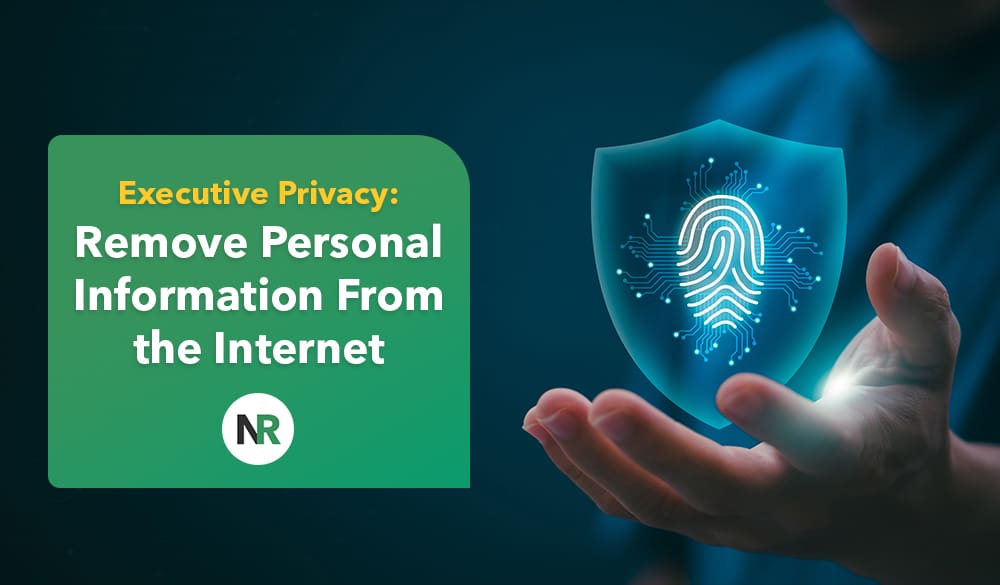Why is executive privacy such a pressing issue? The threat of identity fraud increases every day. Hackers are growing more sophisticated and successful in their efforts to steal your personal information.
The Federal Trade Commission (FTC) conducts annual reports on the prevalence of identity fraud. In 2020, there were roughly 4.7 million reports of fraud and identity theft.
Your personal information is all over the internet. Once hackers acquire your information, it is only a matter of time before they start using your credit cards and making online threats.
The good news is that you can have your information purged from the internet. Read on to learn all about executive privacy and explore solutions that result in the removal of personal information from the internet.
What Type of Information Is Available Online?

Your personal information is littered all over the internet. Every time you make an online payment, your sensitive financial information is available to hackers. Plus, you enter your shipping and billing address whenever you place an order. You give up your online privacy, which gives data brokers a lot of access to your sensitive information.
Your credit card and checking account information is likely out there. And think about the information you make available on your social media accounts. On Facebook, everyone enjoys receiving birthday wishes from all of their friends and family.
Hackers, identity thieves and data brokers love this because you are publicly revealing sensitive personal information. To them, your date of birth is a major piece of the puzzle in stealing your identity.
The bad guys are also able to piece together answers to your security questions through social media. One of the top security questions is, “What is your mother’s maiden name?” Fortunately for the hackers, Facebook lists your family members, and some users even put their maiden name in parentheses.
What Is the Threat Level?
Many people falsely assume identity fraud cannot happen to them. They believe that the odds are astronomically low of it occurring and that they’re safe in terms of online privacy. This could not be farther from the truth.
In a single year, there were nearly 680,000 account takeovers. New account fraud is reaching epic proportions. This occurs when a hacker or identity thief opens up a credit card, loan or even a mortgage using your personal information. Today, almost every tool in the cybercriminal arsenal is being used more frequently.
Cyber attacks and online threats are on the rise, with hackers targeting routers, cameras, supply chains, and more. Formjacking is up, too, with thousands of websites compromised every year.
Not everyone is motivated by money when attempting to steal your information. Some want to steal your sensitive information to damage your reputation or put your family at risk.
Who Is Most Vulnerable to an Attack?

While everyone is vulnerable to identity fraud, some demographics are more at risk than others. For example, your recently deceased loved ones are at a heightened risk. The identities of millions of deceased individuals are stolen each year. This criminal activity is referred to as ghosting.
Even children are at risk of identity theft. Hackers and identity thieves love stealing a child’s social security number because it provides them with a clean slate. Children don’t have a credit history, and very few parents are monitoring their child’s social security number.
Enlisted military members are common victims, too. They are deployed to other parts of the world, so they are less likely to receive calls from debt collectors or catch suspicious behavior on their credit reports.
Also, the elderly are common victims of online scams and hacking attempts. The elderly are not as tech-savvy as younger generations. As a group, they routinely fall for phishing schemes and other predatory online behavior.
Is Executive Privacy at Risk?
Executives and VIPs are also commonly targeted by hackers. They attract hackers because they have so much to lose, which means hackers have a lot to gain.
Typically, corporate executives and VIPs earn a high salary and have more assets than the average person. In many cases, they have access to a company’s assets, too. This makes them an even more valuable target.
In addition to gaining access to financials, hackers often want to destroy an executive’s prominent reputation. Sometimes, destroying the reputation of a VIP is the biggest thrill and accomplishment of all.
Because executives frequently make tough decisions, they have the potential to make more enemies and deal with disgruntled employees. It is becoming increasingly common to see a former employee attempt to tarnish his or her boss’ reputation in an online format.
This means that executives are no longer under the protection of office security. Cybercriminals do not need a security badge for access to executives. The scariest scenario takes place in the real world. With personal information like home addresses easily available online, disgruntled employees can show up at a person’s home to threaten them.
What Is Executive Privacy?

Executive privacy is a process that involves removing a VIP’s personal information from the internet.
An executive privacy service searches for websites that collect your personal information. This is referred to as a full online information audit.
Any site that collects, displays, or repackages your data is included in this search. Background check websites, people search sites and data brokers are common sources that acquire and publish an executive’s information.
Next, the executive privacy service will purge this information from the web. This includes removing personal data such as phone numbers, home addresses, and date of birth from people search sites and similar online sources. The online reputation management company may also remove your family members’ information.
Another critical element of executive privacy is constant monitoring of the internet. Just because your identity is secure today does not mean it will be tomorrow. A high-quality executive privacy company will ensure that your information does not become available in the future.
Executive Privacy and Online Reputation Management
The purpose of safeguarding an executive’s sensitive personal information goes beyond the basics of preventing identity theft. Yes, even VIPs deserve personal space and to feel like their private information is safe. On top of that, though, it’s also necessary to protect an individual’s and brand’s online reputation.
Bad actors sometimes care about tarnishing a VIP’s personal life as much as or more than they want to find phone numbers or credit card information. Being under the spotlight professionally shouldn’t automatically put an executive in an unsafe position, though.
When executive privacy erodes, a person’s or company’s reputation can be damaged, too. Executives and other VIPs have to proactively protect not just their online privacy but also their online reputation so the public perception aligns with their responsibilities, expectations and goals.
Executive Privacy and Removing Personal Information from the Internet
Online threats to executives are real and growing. It is easy for hackers and other bad actors to acquire your personal information on the web.
You may think you’re safe. Chances are, though, that whether it’s from social media or a data broker website, your personal information is available online. Now is the time to act and remove it. This is the most effective way to keep your information safe, maintain your sense of online privacy and protect your reputation.
If you’re in need of executive privacy solutions or other online privacy services, contact us today to speak with a specialist.
